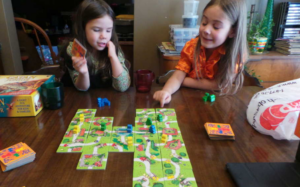|
Listen to this article now
Getting your Trinity Audio player ready...
|
Play is an integral part of childhood, offering children valuable opportunities for growth, learning, and social interaction. Kids games provide a fun and engaging way for children to explore their imagination, develop essential skills, and bond with friends and family. This article explores a selection of the most played kids games, ranging from traditional board games to modern digital platforms, ensuring hours of entertainment and educational value for children of all ages.

Board Games: Timeless Classics
Board games have stood the test of time and continue to captivate children’s imaginations. Classics like Monopoly, Scrabble, and Clue promote critical thinking, strategy, and decision-making skills. Cooperative board games like Pandemic and Forbidden Island foster teamwork and problem-solving abilities. These games offer opportunities for family bonding and friendly competition, encouraging children to think creatively and develop social skills.
Card Games: Portable Fun
Card games are versatile and portable, making them perfect for on-the-go entertainment. Simple games like Go Fish and Crazy Eights help young children develop number recognition, matching skills, and turn-taking abilities. As children grow older, they can graduate to more complex card games like Uno or Rummy, which enhance their strategic thinking, memory, and logical reasoning.
Outdoor Games: Active Playtime
Outdoor games promote physical activity, coordination, and social interaction. Classics like tag, hide and seek, and hopscotch encourage children to engage in active play and explore their surroundings. Team sports such as soccer, basketball, and baseball foster teamwork, sportsmanship, and physical fitness. These games allow children to unleash their energy, enhance their motor skills, and enjoy the benefits of fresh air and sunshine.
Digital Games: Interactive Learning
In the digital age, technology has become an integral part of children’s lives. Educational apps and online games offer interactive experiences that combine entertainment with learning. Platforms like ABCmouse, Khan Academy Kids, and Scratch Jr. provide a range of educational activities, including math, reading, coding, and problem-solving. These digital games engage children’s curiosity, promote cognitive development, and enhance their technological literacy.
Creative Games: Imagination Unleashed
Creative games inspire children to unleash their imagination and explore their artistic abilities. Lego building sets, art and craft kits, and puzzle games allow children to express themselves and develop spatial awareness, problem-solving, and fine motor skills. Role-playing games, such as tea parties, doctor’s office, or pretend play with dolls, stimulate creativity, language development, and social interaction.
Educational Trivia and Quiz Games: Knowledge Building
Trivia and quiz games challenge children’s knowledge and facilitate learning in an engaging way. Games like Trivial Pursuit Junior, Brain Quest, and Quizlet offer age-appropriate questions across various subjects, encouraging children to expand their knowledge, memory, and critical thinking skills. These games can be enjoyed individually or played as a group, fostering healthy competition and a thirst for knowledge.
Conclusion
Kids games provide a wealth of benefits, combining entertainment and learning in an interactive and engaging manner. Whether through traditional board games, outdoor activities, digital platforms, or creative endeavors, children can develop important skills. This including critical thinking, problem-solving, social interaction, and physical fitness. By introducing a variety of these most played kids games into their lives, parents can ensure that their children have a well-rounded and enjoyable playtime experience that promotes growth, learning, and endless fun.

